必修三 Unit 2 Language
- 格式:doc
- 大小:76.00 KB
- 文档页数:9

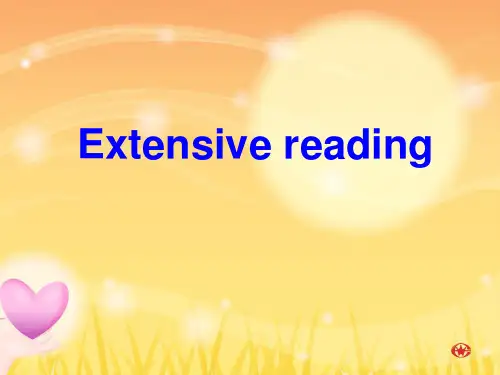
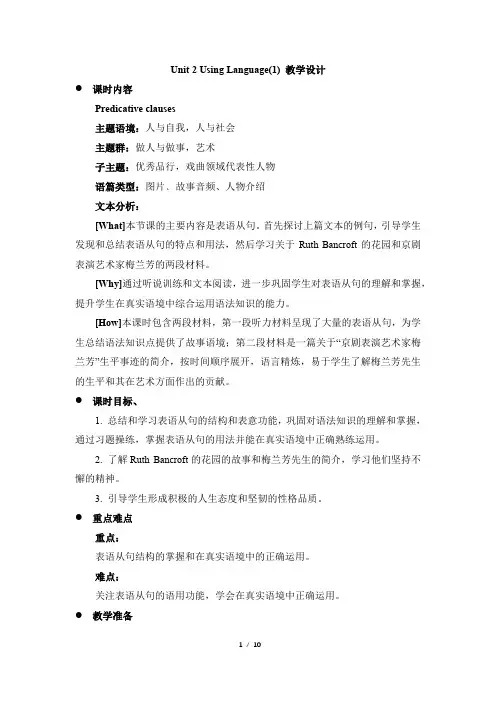
Unit 2 Using Language(1) 教学设计●课时内容Predicative clauses主题语境:人与自我,人与社会主题群:做人与做事,艺术子主题:优秀品行,戏曲领域代表性人物语篇类型:图片﹑故事音频、人物介绍文本分析:[What]本节课的主要内容是表语从句。
首先探讨上篇文本的例句,引导学生发现和总结表语从句的特点和用法,然后学习关于Ruth Bancroft的花园和京剧表演艺术家梅兰芳的两段材料。
[Why]通过听说训练和文本阅读,进一步巩固学生对表语从句的理解和掌握,提升学生在真实语境中综合运用语法知识的能力。
[How]本课时包含两段材料,第一段听力材料呈现了大量的表语从句,为学生总结语法知识点提供了故事语境;第二段材料是一篇关于“京剧表演艺术家梅兰芳”生平事迹的简介,按时间顺序展开,语言精炼,易于学生了解梅兰芳先生的生平和其在艺术方面作出的贡献。
●课时目标、1. 总结和学习表语从句的结构和表意功能,巩固对语法知识的理解和掌握,通过习题操练,掌握表语从句的用法并能在真实语境中正确熟练运用。
2. 了解Ruth Bancroft的花园的故事和梅兰芳先生的简介,学习他们坚持不懈的精神。
3. 引导学生形成积极的人生态度和坚韧的性格品质。
●重点难点重点:表语从句结构的掌握和在真实语境中的正确运用。
难点:关注表语从句的语用功能,学会在真实语境中正确运用。
●教学准备教师准备:1. 表语从句的用法和习题。
2. Ruth Bancroft的花园的故事和梅兰芳先生的简介。
学生准备:1. 预习本课词汇。
2. 预习表语从句的用法。
教学过程Step I学习理解活动一:感知与注意1. Ask students to look at the following sentences from the reading passage and pay attention to the words in bold.2. Have students discuss the questions below and share in groups. Then check answers.•What form does the predicative take in sentences (a)and (b)?•Why is “what” used in sentence (a) and “where” used in sentence (b)?•What other words do you know that can lead a predicative clause?3. Encourage students to look for more sentences with predicative clauses in the reading passage Life behind the lens and share in class.4. Have students summarise the function and usage of predicative clauses in their own words.【设计意图】首先学习摘自上一篇文本的两个句子,关注句中的粗体部分,发现两个例句的相同功能和不同特点,引入本课语法知识——表语从句,激发学生思考,鼓励学生大胆基于已知,讨论表语从句的使用规则,为下一步阅读及学习语法铺垫。
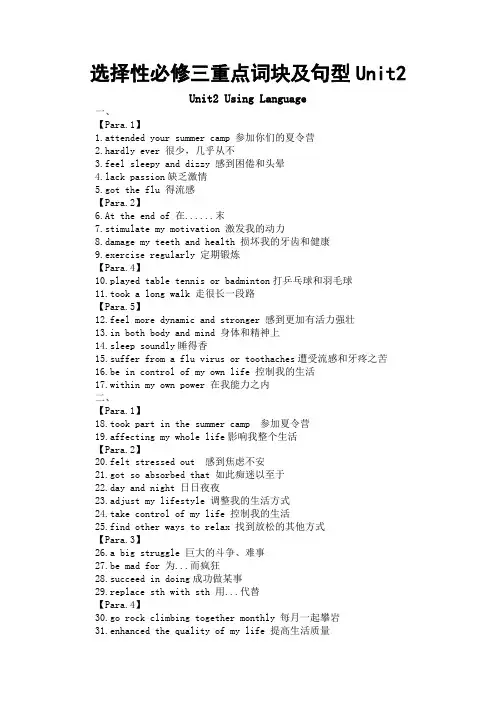
选择性必修三重点词块及句型Unit2Unit2 Using Language一、【Para.1】1.attended your summer camp 参加你们的夏令营2.hardly ever 很少,几乎从不3.feel sleepy and dizzy 感到困倦和头晕ck passion缺乏激情5.got the flu 得流感【Para.2】6.At the end of 在......末7.stimulate my motivation 激发我的动力8.damage my teeth and health 损坏我的牙齿和健康9.exercise regularly 定期锻炼【Para.4】10.played table tennis or badminton打乒乓球和羽毛球11.took a long walk 走很长一段路【Para.5】12.feel more dynamic and stronger 感到更加有活力强壮13.in both body and mind 身体和精神上14.sleep soundly睡得香15.suffer from a flu virus or toothaches遭受流感和牙疼之苦16.be in control of my own life 控制我的生活17.within my own power 在我能力之内二、【Para.1】18.took part in the summer camp 参加夏令营19.affecting my whole life影响我整个生活【Para.2】20.felt stressed out 感到焦虑不安21.got so absorbed that 如此痴迷以至于22.day and night 日日夜夜23.adjust my lifestyle 调整我的生活方式24.take control of my life 控制我的生活25.find other ways to relax 找到放松的其他方式【Para.3】26.a big struggle 巨大的斗争、难事27.be mad for 为...而疯狂28.succeed in doing成功做某事29.replace sth with sth 用...代替【Para.4】30.go rock climbing together monthly 每月一起攀岩31.enhanced the quality of my life 提高生活质量32.get refreshed through climbing 通过攀岩变得神清气爽【Para.5】33.trying out new ways of relaxing 尝试放松的新方法34.feel much more energetic 感到更加有活力35.change myself for the better 让自己变得更好36.be true for sb.对....来说是真的37.it might truly be possible to 有可能做某事38.Be the change you want to see in the world 欲变世界,先变其身【重点句子】1.Whenever I went out with friends.I brought snacks from home, things that didn't have any added sugar: fruit, nuts, dried meat, etc.每当我和朋友出去的时候,我都会从家里带一些零食,一些没有添加任何糖分的东西:水果、坚果、肉干等等。
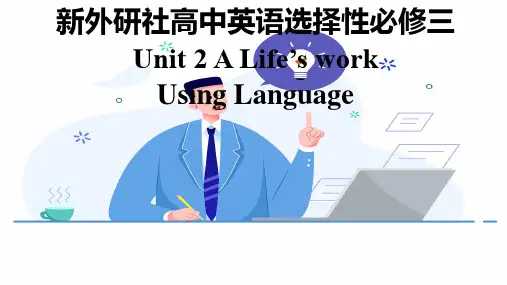

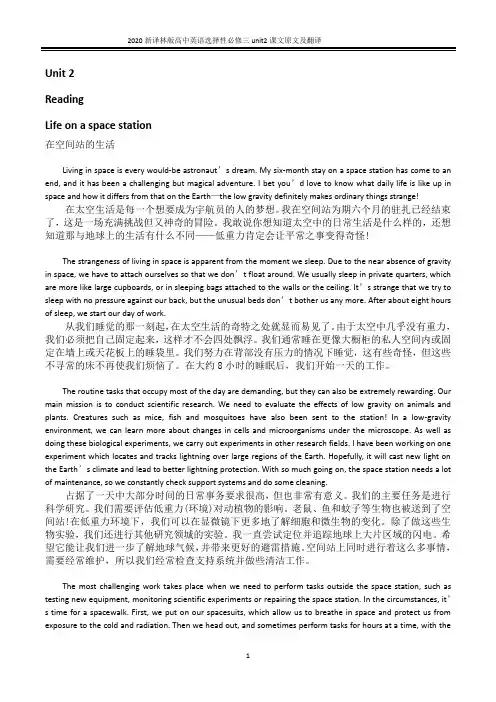
Unit 2ReadingLife on a space station在空间站的生活Living in space is every would-be astronaut’s dream. My six-month stay on a space station has come to an end, and it has been a challenging but magical adventure. I bet you’d love to know what daily life is like up in space and how it differs from that on the Earth—the low gravity definitely makes ordinary things strange!在太空生活是每一个想要成为宇航员的人的梦想。
我在空间站为期六个月的驻扎已经结束了,这是一场充满挑战但又神奇的冒险。
我敢说你想知道太空中的日常生活是什么样的,还想知道那与地球上的生活有什么不同——低重力肯定会让平常之事变得奇怪!The strangeness of living in space is apparent from the moment we sleep. Due to the near absence of gravity in space, we have to attach ourselves so that we don’t float around. We usually sleep in private quarters, which are more like large cupboards, or in sleeping bags attached to the walls or the ceiling. It’s strange that we try to sleep with no pressure against our back, but the unusual beds don’t bother us any more. After about eight hours of sleep, we start our day of work.从我们睡觉的那一刻起,在太空生活的奇特之处就显而易见了。

上教版必修三Unit2The things around us Reading AThe story of a T-shirtLagos,Nigeria—Yaba market is busy,hot and dusty.People are looking around the second-hand shops,picking through piles of old clothes,and they’re all searching for deals.The market is flooded with cheap clothes from America and Europe,ad they usually sell out fairly quickly.“These clothes make people’s dreams come true,”says Abeke,a shop owner.“Everyone wears them.When they put them on,you can’t tell the difference between the rich and the poor.”At the front of Abeke’s store is a cotton T-shirt with the words“Get Real”.It’s picked up by a young guy who looks at it carefully.He tries it on and smiles—it fits him and it looks good.It’s a simple T-shirt,but it has a long story.A few years ago,the T-shirt started life in a cotton field in Uzbekistan.The cotton was watered every day and harmful chemicals were used to kill insects in the field.As the cotton grew,a young woman called Feruza picked it.She sweated in the field for ten to twelve hours every day in temperatures of over30℃,but she was paid very little.Sometimes the chemicals hurt her eyes.Next,the cotton was flown to India.The T-shirt was made in a tiny factory in the Indian port city of Mumbai.There were20adults in it,five children and no air conditioning.The adults made the T-shirts and the children checked them.The finished T-shirt was sent to a huge discount shop in the UK.The people who shopped there didn’t know where the clothes came from.They didn’t want to spend a lot of money,but they wanted to look good.The T-shirt was cheap and it was bought by15-year-old Ryan who liked the words on it.It was washed,worn and ironed and,after a few months,Ryan threw it away.His mum took it to a charity shop with some other old clothes,which were sold to an export company.A few weeks later,the T-shirt made its way to Yaba market in Nigeria.Back at the market,the young man takes off the T-shirt and looks at the$3price tag.He hesitates for a moment and then he offers Abeke$1.50because that’s all the cash he’s got.Abeke shakes her hand.As she hangs up the T-shirt at the front of the shop,the charity shop’s price tag is still on the back:25p.The journey of a T-shirt tells many stories.Stories about people,countries and cultures.Storiesabout farmers and factory workers.Stories about shopping centres.But for most of all,it’s a story about choices,and our choices can make a difference.Do you really need another T-shirt?Do you care where it’s from?What’s the cost to the environment?What’s the cost to the environment? What’s the human cost?Think about it,because our choices could start a new story.Did you know?·Ten thousand litres of water are used to make one T-shirt.·A200-gram T-shirt can use up to5tonnes of resources.·3.4billion T-shirts are sold in the USA every year.·Children as young as seven work in cotton fields and factories.一个T恤的故事尼日利亚拉各斯的yaba市场非常繁忙、炎热、尘土飞扬。
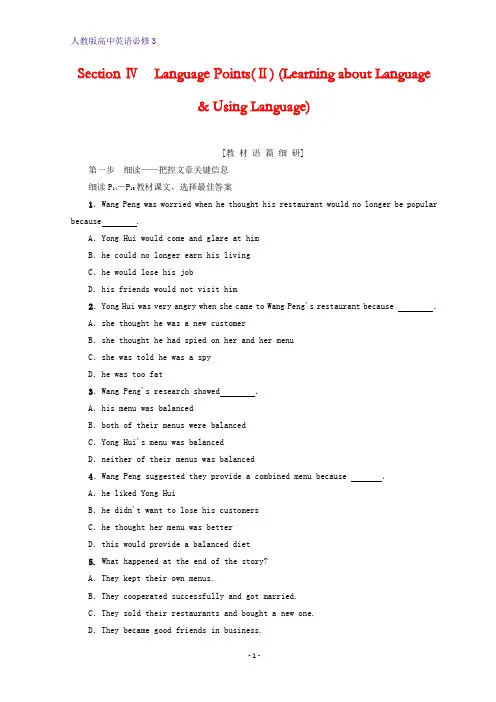
Section ⅣLanguage Points(Ⅱ) (Learning about Language& Using Language)[教材语篇细研]第一步细读——把控文章关键信息细读P14-P15教材课文,选择最佳答案1.Wang Peng was worried when he thought his restaurant would no longer be popular because .A.Yong Hui would come and glare at himB.he could no longer earn his livingC.he would lose his jobD.his friends would not visit him2.Yong Hui was very angry when she came to Wang Peng's restaurant because .A.she thought he was a new customerB.she thought he had spied on her and her menuC.she was told he was a spyD.he was too fat3.Wang Peng's research showed .A.his menu was balancedB.both of their menus were balancedC.Yong Hui's menu was balancedD.neither of their menus was balanced4.Wang Peng suggested they provide a combined menu because .A.he liked Yong HuiB.he didn't want to lose his customersC.he thought her menu was betterD.this would provide a balanced diet5. What happened at the end of the story?A.They kept their own menus.B.They cooperated successfully and got married.C.They sold their restaurants and bought a new one.D.They became good friends in business.【答案】1-5 BBDDB第二步精读——能力升华接轨高考根据P14-15教材课文,在空白处填入1个适当的单词或括号内单词的正确形式To his joy,people began coming to his restaurant again.He was able 1.to earn(earn) his living now.He didn't look forward to being 2.in debt.Then all of 3.a sudden Yong Hui walked in with 4.anger(angry).Wang Peng asked her to try a meal of his.Although enjoying the dumplings 5.served(serve) there,Yong Hui looked ill and felt sick with the fatty pork and all those heavy food.They chatted about offering a 6.balanced(balance) diet and providing a balanced menu to cut 7.down the fat and increase the fibre in the meal.They learned from each other.Before long Yong Hui put on more weight and Wang Peng became 8.slimmer(slim).9.In the end they decided to turn the two restaurants into a big one.They got 10.married(marry) and lived happily ever after![语言基础自测]Ⅰ.单词拼写根据汉语或首字母提示,写出下列单词1.There was no hope,so he sighed (叹气) with sadness.2.When will you pay off all the debts(债务)?3.We set a time limit(限定) of thirty minutes for the test.4.As students we should combine book knowledge with practice.5.The new law gains the support of farmers,who will benefit from the new law.6.You can consult a doctor about health problems.Ⅱ.拓展词汇根据词性和汉语提示,写出下列单词1.poison n.毒药;毒物→poisonous adj.有毒的2.limit vt.& n.限制;界限→limited adj.有限的→limitless adj.无限的3.benefit n.利益;好处vt.&vi.有益于;受益→beneficial adj.有益的;有好处的4.combine vt.&vi.使联合或结合→combination n.联合;结合5.cooperate vi.合作;协作→cooperation n.合作;协作Ⅲ.补全短语根据提示补全下列短语1.earn one's living谋生2.in debt欠债3.cut down削减,删节4.before long不久以后5.put on weight增加体重Ⅳ.选词填空选用上述短语的适当形式填空1.He earns his living by selling vegetables.2.Don't drink too much beer,or you will put on weight.3.You must cut down on sugar to lose weight.4.Wasteful people usually end up in debt.Ⅴ.经典句式仿写1.I don't want to upset you,but I found your menu so limited that I stopped worrying and started advertising the benefits of my food.我并不想让你心烦,不过我发现你的菜谱上的菜太有限了,所以我也就不担心了,我也开始宣传我的食物的好处了。
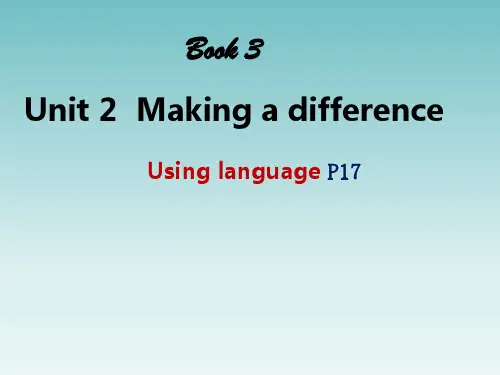
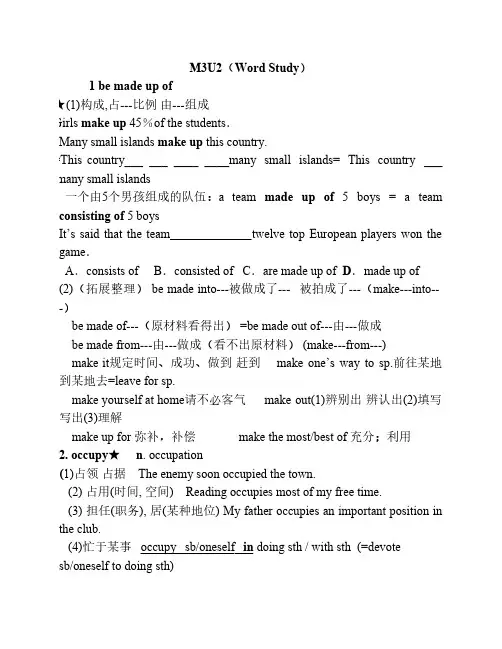
M3U2(Word Study)1 be made up of★(1)构成,占---比例由---组成Girls make up 45%of the students.Many small islands make up this country.=This country___ ___ ____ ____many small islands= This country___ many small islands一个由5个男孩组成的队伍:a team made up of 5 boys = a team consisting of 5 boysIt’s said that the team twelve top European players won the game.A.consists of B.consisted of C.are made up of D.made up of(2)(拓展整理) be made into---被做成了--- 被拍成了---(make---into---)be made of---(原材料看得出) =be made out of---由---做成be made from---由---做成(看不出原材料) (make---from---)make it规定时间、成功、做到赶到 make one’s way to sp.前往某地到某地去=leave for sp.make yourself at home请不必客气 make out(1)辨别出辨认出(2)填写写出(3)理解make up for 弥补,补偿 make the most/best of 充分;利用2. occupy★ n. occupation(1)占领占据 The enemy soon occupied the town.(2) 占用(时间, 空间) Reading occupies most of my free time.(3) 担任(职务), 居(某种地位) My father occupies an important position inthe club.(4)忙于某事 occupy sb/oneself in doing sth / with sth (=devotesb/oneself to doing sth)be occupied in doing sth /with sth (=be devoted to doing sth )1.__________ reading history books, he even didn’t notice me coming.A. Occupied withB. Occupying withC. Occupied inD. Occupying in2.________ himself _____ the project, he had no time to go back home.A. Occupied; withB. Occupying; withC. Occupied; inD. Occupying; in3、mixturev. mix (1)mix(v.)混合/混淆弄混/配制调制-mixture(n.) -mixed(adj.)(2)mix up 拌合/混淆搞糊涂 I was all mixed up.(3)have a mixture of good luck and bad luck喜忧参半4. 、name…after… 以---给---命名name(1)n.名字(2)n.名声(3)v.给---取名 name him Tom5. aside from除---之外=apart fromAside from them, I have no one to talk with. (=except)Aside from English, he can speak German. (=besides)6. 、contribution(1)make a contribution/contributions to (doing) sth.为---作出贡献We should do whatever we can to make a contribution to protecting our environment.As young people, we have to work hard and try to make contributions to our country.(2) v. contribute contribute to---(1)有助于, 促进(2)导致-(3)捐助(4)为---作贡献(5)为---写稿Exercise contributes to good health.He contributed two stories to the magazine.We contributed food and clothing to the poor.7、take control of---控制-lose control of---失去对---的控制 sth be under control被控制住keep---under control控制 exercise control over---对---施加控制beyond one's control out of control8、lead to(1)导致lead to (sb) doing sth.导致干某事result in sb _____(do)/ cause sb ____(do).Hard work results in(leads to/causes)success./ Success results from hard work.He was caught in the rain, resulting in him being ill.(结果状语)(2)通向通往lead to sp. All roads lead to Rome. ________________(翻译)9.replacereplace Jim=take Jim’s place=take the place of Jimreplace A with B 用B来代替A10.、entire (adj.)完全的整个的all day/the whole day/the entire day 一整天,全天I’m in entire agreement with you.我完全同意你(修饰抽象名词只能用entire)11. raise (1)养育饲养种植(2)举起抬起(3)增加提高提升(4)筹集筹募(5)提出发出(6)引起唤起扬起(7)竖起建起养家raise a family 养鸡raise chickens 举手raise one’s hand提高价格raise price 抬高声音raise one’s voice 筹钱 raise money升旗 raise the flag 提出观点 raise one’s view注意:raise是vt. 而rise是vi. 无被动 (rose,risen) 这两个单词都不能和up连用The sun rises in the east. 太阳从东方升起12、therefore(1)因此所以:therefore/so/thusThey told her to water the flowers every morning, and thus(therefore) she did it.therefore还可放在句中:They therefore can learn English well.therefore还可作插入语:Many fast food restaurant, therefore, have red furniture or walls.(2)thus doin g可作结果状语,thus可省,表示自然而然的结果, 而therefore,so没有这样的用法He didn’t come today, (thus) making it necessary for us to find someone to do the job.(only) to do 也可作结果状语,表示出其不意的结果。
Unit 2 Using Language(2) 教学设计●课时内容The spirit of craftsmanship主题语境:人与自我主题群:做人与做事子主题:优秀品行,正确的人生态度语篇类型:图片、人物介绍、音频文本分析:[What]本课时内容为综合语言运用。
首先听有关“传统手工艺”的音频,学习“Giving reasons”和“Checking knowledge”的相关表达含义及语用功能,再学习有关“传统手工艺”逐渐失传和“两弹一星”元勋科学家们(邓稼先、于敏﹑钱学森)优秀品质的语篇。
[why]通过听力训练和阅读语篇,从多方面开阔学生的视野,进一步理解传统手工艺的现状和逐渐消亡的原因,提升语言在真实语境中的综合运用能力;学习“两弹一星”元勋科学家们为科学献身的精神,进一步加深对“工匠精神”的理解。
[How]本课包含一段听力材料和两个语篇,分别关于“传统手工艺”与“科学家优秀品质”,与本单元话题“工匠精神”密不可分。
●课时目标1. 了解传统手工艺逐渐消亡的原因以及思考应对措施。
2. 掌握“Giving reasons”和“Checking knowledge”的相关语用表达。
3. 理解有关人物品质的词汇及表达,并能在具体语境中灵活使用。
4. 感悟工匠精神,学习“两弹一星”元勋科学家们“热爱祖国、无私奉献﹑自力更生﹑艰苦奋斗、大力协同、勇于登攀”的精神。
●重点难点重点:1. 学习有关人物品质的词汇及表达并能在具体语境中灵活使用。
2. 理解“Giving reasons”和“Checking knowledge”的相关语用表达并进行运用。
难点:正确认识“工匠精神”,思考如何传承和践行。
●教学准备教师准备:1. 传统手工艺的相关信息。
2. “两弹一星”元勋科学家们的相关资料。
学生准备:1. 预习本课词汇。
2. 自己喜欢或了解的某领域的杰出人物的事迹。
●教学过程Step I学习理解活动一:感知与注意1. Write “traditional crafts” on the blackboard and have students discuss what they knew about it.2. Encourage students to list as many traditional crafts as they know, especially in their home town, and judge which of them are dying out or have died out.3. Have students read the four sentences below and catch their meanings.①To introduce famous traditional crafts to the audience.②To raise the audience’s awareness of preserving traditional crafts.③To replace traditional crafts with modern technology.④To tell the stories of some famous craftworkers.【设计意图】在黑板上写下traditional crafts,鼓励学生讨论已知的(家乡)传统手工艺以及它们的现状,并学习与之相关的背景知识,为下一步的听力做铺垫。
Module 3 Unit 2 Language新课标单词throughout prep. 贯穿,遍及confusing adj. 令人迷惑的,令人不解的vocabulary n. 词汇tribe n. 部落European adj. 欧洲的;欧洲人的n. 欧洲人create vt. 创造,创建,创作nowadays adv. 现今,现在official adj. 官方的,正式的consist vi. 组成consist of 由……组成,由……构成contribute vi. & vt 贡献contribute to 是……的成因之一development n. 发展;开发take control of 控制,取得对……的控制rule vt. & n 统治replace vt. 替换,代替,取代*despite prep. 尽管*impact n. 巨大的影响,冲击servant n. 仆人raise vt. 饲养ox n. (复数oxen)牛,公牛ending n. 词尾,结尾,结局upper adj. 上层的,上面的,上边的class n. 阶级,阶层adopt vt. 采用tongue n. 语言;舌头mother tongue 母语,本国语modern adj. 近代的,当代的,现代化的,时髦的,时新的include vt. 包括pronunciation n. 发音,语音style n. 风格process n. 过程;进程depend vi. 视……而定,依靠depend on 视……而定;取决于,依赖于,依靠record vt. 记录promise vt. & vi 许诺,答应n. 许诺,诺言difficulty n. 困难unknown adj. 不知道的,未知的disagree vi. 意见不一,分歧;不一致standard n. 标准adj. 标准的set vt. 确定(标准等),制定(标准等)phrase n. 词组,短语department n. 部门ban vt. 禁止,取缔pure adj. 纯的,纯洁的spread n., vi & vt 传播easily adv. 容易地,不费力地access vt. 接近,使用n 接近的机会,享用权across prep. 在……各处,遍及racial adj. 种族的character n. (书写或印刷)符号Chinese character 汉字differ vi. 相异,有区别differ from 和……不同,不同于represent vt. 代表action n. 行为,动作,行动combine vt. & vi 组合,(使)联合,(使)结合writing n. 文字;文字作品drawing n. 绘画,绘画艺术physical adj. 有形的;实物的;物质的square adj. 方的,正方形的n. 方型,正方形simplify vt. 简化complex adj. 复杂的originally adv. 最初,原先,起先eventually adv. 最后,终于,最终reflect vt. 反映,反射prisoner n. 囚犯symbol n. 符号;象征direction n. 方向opposite n. 相反的事物,相对立的事物indicate vt. 显示,表示,象征,暗示pronounce vt. 发音课文出现短语1. in a sense2. stand for3. all over the world4. inform sb of sth5. throughout history6. be made up of7. bring sb with sth8. speak a language9. be different from10. consist of11. the official language12. find it hard to do sth13. contribute to14. take control of15. be replaced with/by16. even though17. despite the fact18. have an impact on19. the English language20. result in21. work as22. the way of doing sth23. because of24. depend on25. quite a few26. make up27. have a word with sb28. a six-year-old kid29. right away30. take action31. look forward to (doing) sth32. a waste of time33. leave out34. in any case35. come true36. look up37. used to do sth38. care about39. at one time40. due to41. get to the point42. waste time doing sth.43. make fun of44. be used to do sth45. in addition46. in a word 47. it seems likely that48. sb is likely to do sth49. concentrate on50. in a short51.a written/spoken language52. differ from…in…53. as a whole54. develop into55. combine…together56. in the 1950s57. be widely usedReading English and its historyAll through history, people from many different countries and cultures have lived together in Britain. The English language is made up of the grammar and vocabulary these people brought to Britain. That is why English has so many difficult rules that confuse people.Old EnglishOld English is very different from the English we speak nowadays. In fact, we would not be able to understand it if we heard it today. Before the middle of the 5th century, people in Britain all spoke a language called Celtic. Then two Germanic groups from the European mainland—the Angles and the Saxons— occupied Britain. Old English consisted of a mixture of their languages. (Both the English language and the English people are named after the Angles; the word Angle was spelt Engle in Old English.) Aside from place names such as London, very few Celtic words became part of Old English. At the end of the 9th century, the Vikings, people from Northern European countries such as Denmark and Norway, began to move to Britain. They brought with them their languages, which also mixed with Old English. By the 10th century, Old English had become the official language of England.When we speak English today, we sometimes feel puzzled about which words or phrases to use. This is because English has many words and phrases from different languages, but with similar meanings. For example, the word sick came from a word once used by the Angles and the Saxons, while ill came from a word once used by the Norwegians.Middle EnglishMiddle English is the name given to the English used from around the 12th to the 15th centuries. Many things played a part in the development of this new type of English. The most important contribution was from the Normans, a French-speaking people who defeated England and took control of the country in 1066. However, the Norman Conquest did not affect English as much as the Angles and the Saxons’ victory about 600 years earlier, which led to Old English replacing Celtic. Even though the Normans spoke French for the entire 250 years they ruled England, French did not replace English as the first language. On the other hand, the English language did borrow many words from French. This resulted in even more words with similar meanings, such as answer (from Old English) and reply (from Old French). It is interesting to learn how the words for animals and meat developed. After the Norman Conquest, many English people worked as servants who raised animals. Therefore, the words we use for most animals raised for food, such as cow, sheep and pig, came from Old English. However, the words for the meat of these animals, which was served to the Normans, came from Old French: beef, mutton, pork and bacon.Old French made other contributions to Middle English as well. In Old English, the Germanic way of making words plural was used. For example, they said housen instead of houses, and shoen instead of shoes. After the Normans took control, they began using the French way of making plurals, adding an -s to house and shoe. Only a few words kept their Germanic plural forms, such as man/men and child/children. After the Norman Conquest, high-class people spoke French while common people spoke English. However, by the latter half of the 14th century, English had come into widespread use among all classes in England. In 1399, Henry IV became King of England. His mother tongue was English, and he used English for all official events.Modern English Modern English appeared during the Renaissance in the 16th century.Because of this, Modern English includes many Latin and Greek words. Pronunciation also went through huge changes during this period. Of course, this was not the end of the changes in the English language. The question of whether English will keep on changing in the future is easy to answer. It is certain that this process will continue, and people will keep inventing new words and new ways of saying things.英语及其历史有史以来,在不列颠共同生活着来自许多不同国家和文化背景的人们。